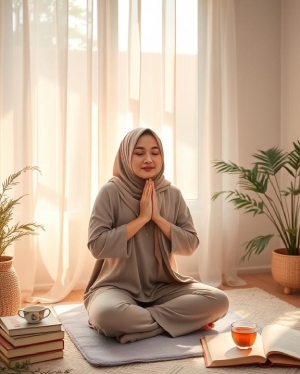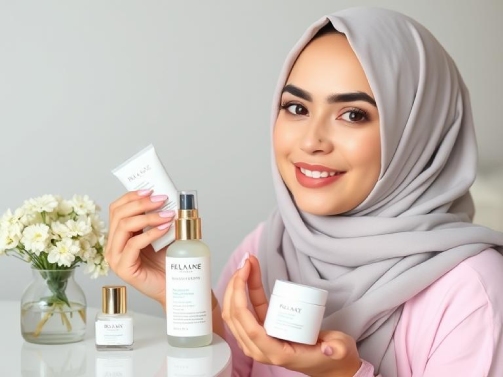
This concept of wellness and self-care is so precious in an increasingly busy and stressful life. For a Muslim woman, indulging the body in nourishment and care, and nurturing the mind and spirit are acts that fulfill the Sunnah, and is in fact part of embracing a balanced lifestyle. In recent days, self-care has come to form a very important part of living intentionally-from attending mental health sessions to maintaining that perfect skincare routine to hitting the gym and beyond. In the chapters that follow, we will explore holistic approaches to wellness where Islamic teachings meet contemporary methods of self-care that guide you to live out your own standards as you care for yourself on all the finer details.
Embracing Mental Health in Islam
In many cultures, including the Muslim community (Ummah), mental health has mostly been ignored. However, the necessity to nurture both body and mind has come to be acknowledged by society. Islamic knowledge has shed lights on dealing with emotional distress, stress, and other challenges of life to ensure peace of mind.
In Islam, it is strength to seek help rather than weakness, mental-health-wise. The Prophet Muhammad (PBUH) declared that “Seeking knowledge is an obligation upon every Muslim,” which means that seeking knowledge about mental health is included. From the Islamic point of view, taking care of yourself is considered an active process of prayer, meditation, or seeking the help of professionals to guarantee emotional well-being.
Incorporating Wellness Activities into Daily Life
Wellness routines do not have to be complicated in daily life. Taking care of your mental health, physical activity, and personal growth are all simple yet effective methods of practicing a holistic approach to wellness. Here are a few suggestions:
Prayer and Mindfulness (Salah)
The five daily prayers are not only connecting with the Divine but also provide moments of reflection and mindfulness. Allowing oneself to stand, bow, and prostrate while experiencing intimate communion with Allah grounds one into that very present moment.
Dhikr and Meditation
Engaging in Dhikr (remembrance of Allah) on a regular basis serves to calm the mind and reduce stress. This mindful practice can be paired with deep breathing or guided meditation for a more intensive self-care regime.
Connecting with Nature
Nature is replete with opportunities for one to recharge and reconnect. Being dressed in a casual attire and just strolling in and around a park, taking a hike up a mountain, or simply sitting by a river-side for some moments of benevolent contemplation-all these are just some ways to partake in the outdoors for serenity.
Skincare: Caring for Your Body Inside and Out

Skincare goes beyond the cosmetic routine; it is loving yourself and reminding yourself to care for the body that Allah has entrusted to you. For Muslim women, especially those who wear hijabs, skincare is vital because all kinds of environmental factors can affect the skin-from harsh sunlight and heat to humidity or dryness-from simply wearing a hijab.
A good skincare regimen ensures the skin remains healthy and radiant. Here are some quick tips to nourish your skin:
- Hydration is everything: Ensure you drink enough water throughout the day. The benefits of hydration are numerous, one being skin hydration and elasticity.
- Gentle Cleansing: Start with mild, non-comedogenic cleansers. Cleanse twice-a-day to rid the skin of dirt, oil, and impurities without stripping the skin off its natural oil.
- Moisturizing: Follow with a lightweight moisturizer that does not grease the skin and suits one’s skin type. Moisturizing is very important for the skin, especially after cleansing.
- Sunscreen Protection: When it comes to sun protection, always opt for a sunscreen with the highest SPF that will protect the skin from the harmful rays of UV. The act of applying sunscreen is rather pertinent both indoors and outdoors.
Fitness and Physical Health: Empowering Your Body
Although wellness gravitates more toward the realm of mental and emotional health, physical health is just as big of a consideration. Faithfully working out is a unique self-care that nourishes your physical strength while uplifting your mood and boosting your energy. In Islam, caring for your body is basically thanking Allah for giving you that physical form.
Regular physical activity need not be extremely intense or time-consuming. Even simple and low-impact activities like walking and swimming can reward your health very greatly. Getting fit need not be a chore.
- Walk daily: A brisk 30-minute walk is excellent for cardiovascular health and will infuse energy into one’s body.
- Yoga and Stretching: Yoga offers flexibility, stress relief, and greater concentration. It is usually a very good thing to do to chill out after a long day.
- Strength Training: Light strength training to build muscle will give your metabolism a boost, improve posture, and strengthen you generally. You really don’t need heavy weights to do this; exercises such as squats, lunges, and push-ups that use your own body weight are fully adequate.
The Sunnah of Self-Care
With Islam, self-care is a therapeutic nourisher of the soul. The Sunnah is full of wisdom on how to care for oneself in all aspects of life. The Prophet encouraged Muslims to lead once again a normal balanced life which included eating healthy, sleeping well, and keeping a strong tie with Allah.
According to the Sunnah, alimentary saving is a sacrifice for the soul of the individual. The Prophet (PBUH) himself would walk a lot for physical exercise, go horseback riding, eat moderately and not excessively, and give great importance to sleep, relaxation, and detachment from the stress of everyday life.
Importance of Health and Self-Care
Building self-care in our fast-moving world is indeed tricky. With endless responsibilities from work, family, and day-to-day living, wellness always takes a backseat. And when it ceases to exist at all, burnout is inevitable, and so bad with mental fatigue and even physical ailments.
Wellness and self-care were important for strengthening an individual-build physically and mentally. By caring for ourselves, we are able to better care for others, maybe meet our commitments, and also become more connected to Allah as we begin realizing the importance of taking care of the body and soul He has entrusted to us.
Related Articles

The Sunnah Sleep Routine – A Path to Restful and Restorative Sleep
All of us would like to get enough rest, but in this fast-paced world, it is sometimes hard to accomplish. There is work, family, social expectations, and distractions modern life has to offer …

The Best Skincare Routine for Oily Skin Under a Hijab
The wearing of a hijab can be empowering, beautiful, and part of one’s identity; on the other hand, it can also come with certain unique challenges in caring for the skin, especially when dealing with oily skin…

